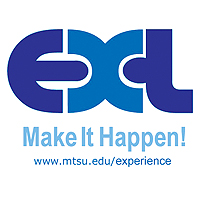
Dr. Jill Austin speaks to faculty members in the Experiential Learning Scholars Program while discussing EXL's five years of success at MTSU. (MTSU photo by J. Intintoli)
The Experiential Learning initiative at MTSU is heading into its sixth year, and the program is now flourishing as a model of hands-on learning through practical application and public service.
It began in 2003 as a mandate by the Southern Association of Colleges and Schools to develop a Quality Enhancement Plan to improve and enhance MTSU student learning. After an initial planning meeting, committee members broke into small groups and bounced around QEP ideas.
“Every group came back with an idea that had something to do with service learning,” said Dr. Jill Austin, who chaired the larger body and has led the EXL initiative from the start. “So experiential learning became our focus. We had marketing students develop logo ideas, and people voted. We came up with ‘EXL—Make It Happen!’”
Austin noted that organizers “could not have imagined how many forms we would need to make this process work,” but work it did, after implementation in fall 2006.
Every college is involved in EXL now, Austin said, and more than 100 EXL courses have been approved.
 “We started out with 122 EXL sections, and we’ve added to that every year,” she said. “Last year we had 314 sections. We have 168 participating faculty now. We started with 54 faculty. The first academic year of EXL classes, we enrolled 1,700 students. Last academic year, we had nearly 5,200 students.”
“We started out with 122 EXL sections, and we’ve added to that every year,” she said. “Last year we had 314 sections. We have 168 participating faculty now. We started with 54 faculty. The first academic year of EXL classes, we enrolled 1,700 students. Last academic year, we had nearly 5,200 students.”
Students can become EXL Scholars if they take 16 to 18 EXL credit hours and complete an EXL 4000 course that requires an electronic portfolio of their EXL activities, Austin explained.
“The second year of EXL we had 15 EXL Scholars,” she noted. “Last year, we had 148.”
The economic impact of the EXL program also is significant, bringing more than 3,000 EXL projects to the greater community with an estimated 194,000 hours of public-service work, Austin said.
“Based on $8 an hour for every hour students spent, the impact on middle Tennessee of EXL was just over $1 million in 2007-08,” the professor continued. “By 2010-11, it was $1.5 million. EXL is making a huge impact on the community while the students are earning class credit.”

Dr. Sharon Smith speaks to faculty members in the Experiential Learning Scholars Program. (MTSU photo by J. Intintoli)
Dr. Sharon Smith, speech and theatre professor at MTSU, teaches organizational communication. Adding the EXL component to the ORCO introductory course means 10 hours of volunteer work for each student, leading to students working with Room in the Inn, the Domestic Violence Program of Murfreesboro, the Make a Wish Foundation, Habitat for Humanity and other organizations.
As a result, the professor said, students who never thought about nonprofit work now wants to work “somewhere where [they] can make a difference.”
Fay Parham, director of MTSU’s Office of Institutional Effectiveness, said students are calling for more EXL offerings when they fill out their graduating-senior surveys.

Dr. Lorne McWatters speaks to faculty members in the Experiential Learning Scholars Program. (MTSU photo by J. Intintoli)
“For the past two or three years, students have been saying to ‘have more EXL classes,’ or to ‘please add an EXL component to what we have to take.’ I thought that was impressive. EXL is probably among the top five quality programs in the SACS quality-enhancement plans, and I’ve seen a lot of them,” Parham said.
MTSU senior Lindsey Rose said EXL creates a good balance of education and experience, especially when applying for a job.
“It landed me a position at the Nashville Zoo, which has given me great insight into the nonprofit sector,” said Rose, who is earning a double major in organizational communication and global studies. “With my fellow ORCO majors, there is a certain confidence in finding a job that I don’t see as often in other majors. I have no doubt that the EXL-focused classes have a hand in this.”
Other EXL students are involved in producing documentaries and oral histories and applying hands-on learning in areas such as civic engagement and international studies.
“The EXL designation looks good on your resume,” said Dr. Lorne McWatters, history professor, whose students have produced films on the history of the university, the community and their own families. “I think employers like to see that. It shows involvement.”
For more information about experiential learning at MTSU, visit www.mtsu.edu/experience.
— Tom Tozer (Thomas.Tozer@mtsu.edu)


COMMENTS ARE OFF THIS POST